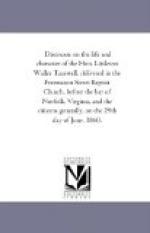zenith, a slow shake of the head or even of his finger
at an argument that was too hard for him, went a great
way even with the court, and almost all the way with
the jury. As long as the case lay in the old
routine, this class of lawyers would get along very
well; but novelties were unpleasant to them; they
hated the subtleties of special pleading; and they
turned pale at a demurrer. Possessed of a high
spirit, which sometimes, even beyond three-score,
sent forth a flash as vivid as it was sudden, he was
placable and ever prompt to make an atonement.
He was now in his forty-eighth year, and in the full
vigor of a temperate middle life; but he lived to
be the father of the bar for almost the third of a
century, and almost to be the father of the town, which
in an honorable sense he was; dying in January, 1833,
at the age of seventy-eight, and laid away by the
hands of descendants among patrimonial graves at Shenstone
Green. He was a true patriot. In the hour
of her fiercest trial he stood by the side of Virginia.
While so many men of wealth and influence in the neighboring
counties of Princess Anne and Norfolk, impelled by
their fears, present and prospective, of British power,
and living within the range of British guns, faltered
in their faith to the young republic, and took British
protection, Nimmo clung to the standard of his country;
and, having been taken prisoner, was confined on board
the Liverpool frigate when she fired the shot which,
striking the south-eastern angle of St. Paul’s
Church, has left its mark for posterity. One
recollection personal to myself shows this fine old
man in an amiable view. I had received, at the
age of one-and-twenty, an important trust from the
people of Norfolk; and Mr. Nimmo, meeting me in the
street the morning after the election, and taking
in his own pure hands both of mine, said: “My
young friend, remember that you owe a double service—service
to your God as well as to your country; and that he
who is faithless to the God of his fathers can never
be faithful to his country.” And now, when
the day of ambition with me is long past and gone,
and when that day of retribution, which, as it cometh
to all, so it shall come to us, is drawing nigh, I
may say that it ever has been my fervent and steadfast
prayer to be able to illustrate in my humble life
the precept of my pious friend.
There was another lawyer, the junior of Nimmo by five years, whose subsequent intimate connexion with Mr. Tazewell makes it proper to recall his position here. The name of Col. John Nivison was pronounced with pride by our fathers, and deserves to be held in grateful remembrance. None under seventy can recall him as he pleaded at the bar; and none under fifty, and very few of that age, can recall him as he sat in the chair of the Recorder. That office was justly held in high repute in olden time. Sir John Randolph held it; and at a later day it was held by the celebrated Edmund Randolph, the great




